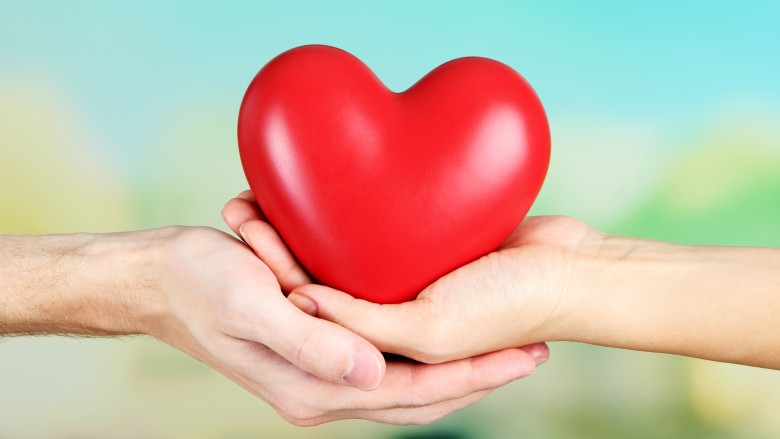The Real Reason You Should Forgive And Forget
Forgiveness is good for you. Just let it go. We've all heard these phrases, but what do they really mean? Sure, forgiveness sounds nice, but what do you do when you're just not ready? When you've been wronged and the other person doesn't even feel bad about it?
Turns out that this may be the most important time to forgive and move on. "There is an enormous physical burden to being hurt and disappointed," says Karen Swartz, M.D., director of the Mood Disorders Adult Consultation Clinic at Johns Hopkins Hospital. You may not even realize how bad you feel until you decide to forgive. Studies have shown that being a forgiving person not only leads to healthier relationships, but also to lowered blood pressure, better heart health, and even a stronger immune system. After reading this, you just may be ready to let it go.
What is forgiveness?
According to the Mayo Clinic, forgiveness is "a decision to let go of resentment and thoughts of revenge." So many of us can get caught up in the littleness of a situation. Thoughts like "she doesn't deserve to be forgiven" or "he needs to apologize first" can keep us stuck. Forgiveness does not mean we're excusing the other person's behavior. It just means that we're ready to move on, and it's time we did so.
Feeling "unforgiving" can lead to a slew of problems. You'll be more likely to bring that anger and bitterness into other relationships. You could feel so wrapped up in those negative feelings that you'll find you're not truly enjoying the present moment. Eventually hanging onto those old resentments can lead to depression and anxiety. You could even lose the positive connections and relationships you have.
You'll live longer
If you're still stewing about the barista getting your order wrong this morning, it's time to move on for lots of reasons, but most importantly because you'll live longer. A 2011 study in the Journal of Behavioral Medicine found that people who practice "conditional forgiveness" may be more likely to die earlier. Conditional forgiveness is offering forgiveness only when the other person apologizes first. The researchers explained that you'll probably be quicker to forgive when the other person admits it was his fault, but you shouldn't need that to move on.
The problem with needing an apology is that you might not get one. The researchers found that without an apology, the conditional forgivers still held onto anger and resentment. Over time, this stress takes a toll on our heart health.
The solution? Don't wait for the "I'm sorry." Don't give the other person that much power. If you're already mad at them, don't give them the ability to shorten your life! Forgive and walk away.
Your heart will thank you
When you are harboring negative feelings for a friend, it weighs on you. You may feel more irritable or tired all of the time. Well, it's not just your brain that is in hyperdrive when you're obsessing about the fight. Your heart has to work overtime, too.
A study in the Journal of Behavioral Medicine asked 100 college students to think of a time when they felt betrayed, then monitored their blood pressure and heart rate. The researchers used surveys to determine if the students were likely to forgive or not. The students with "trait forgiveness" had lower blood pressure readings than those who did not consider themselves forgivers. Trait forgivers also had lower heart rates at baseline and when thinking of the betrayal. And while everyone's blood pressures increased when they thought about the betrayal, the forgivers' blood pressures returned to normal faster than the other group.
You'll feel stronger
Letting go of a long-held grudge will absolutely help your mind feel lighter, but it may do the same for your body. A study in Social Psychological & Personality Science found that being a forgiving person may help you in physical challenges. Researchers from Erasmus University's Rotterdam School of Management in the Netherlands asked half of their study participants to think of a time when they forgave a loved one and the other half to think of a time when they were wronged, but did not forgive. After writing about their experiences, the participants walked to a nearby hill and were asked to estimate the slant of the hill. The participants who had just written about forgiveness rated the hill as less steep than the ones who had only focused on the negative. "The benefits of forgiveness may go beyond the constructive consequences that have been established in the psychological and health domains," the researchers wrote. "Our research shows that forgivers perceive a less daunting world, and perform better on challenging physical tasks."
Perhaps offering forgiveness, regardless of the original situation, helps you navigate any new challenge during your lifetime. "A state of unforgiveness is like carrying a heavy burden — a burden that victims bring with them when they navigate the physical world," explained the researchers. "Forgiveness can lighten this burden."
You'll feel better
The moment you decide to forgive your friend, you know you'll feel relieved. It turns out that if you continue to be a forgiving person, you may end up feeling lighter and less stressed throughout your life. Stress takes a toll on our mental health, but forgiveness could be the antidote.
A study in the Journal of Health Psychology looked at the connection between everyday stress and mental health. Researchers found that people who reported higher levels of stress had worse physical and mental health. That finding doesn't seem that earth-shattering, but the researchers also found that the study participants who were found to be "highly forgiving" were protected from this stress-induced effect. In other words, even if they reported high levels of stress, it didn't affect their health. "It's almost entirely erased —it's statistically zero," study author Loren Toussaint, associate professor of psychology at Iowa's Luther College, told Time. "If you don't have forgiving tendencies, you feel the raw effects of stress in an unmitigated way. You don't have a buffer against that stress."
You'll become a better person
If you're annoyed with your friend for talking about you behind your back, but decide to forgive her, research shows that it will bring the two of you closer. However, that one act of forgiveness stretches out into your other relationships and possibly even the world.
A review in the Personality and Social Psychology Bulletin found that forgiving people actually increase their feelings of connectedness with everyone in their lives, not just ones they have personally forgiven. The study participants who considered themselves forgivers were even more likely to donate to charity and volunteer their time.
How to start
All right, so maybe you're feeling open to the idea of forgiveness. When it still feels hard, where can you start? The researchers at Mayo Clinic recommend beginning with a commitment to change. Just opening yourself up to the idea of forgiveness is a good step. Think about what forgiveness could mean for you and your life. Will you feel free, lighter, happier?
Then think about how this situation has affected your life. Has your health or sleep suffered? Are you thinking about that old argument all the time? Finally, when you're ready, make the decision to forgive. You don't even have to tell the other person. Let it go for yourself.
You don't actually have to forget
Many of us worry that forgiving someone who has wronged us will just give that person permission to do it again. Offering forgiveness should not give anyone a license to walk all over us. Forgiveness researchers Michael McCullough and Everett Worthington have made it clear that forgiving is not the same as pardoning the offense in the first place.
McCullough and Worthington believe forgiveness is all about our internal motivation. It really has nothing to do with the other person. We don't have to think what they did is okay in order to move forward. In a research paper, McCullough and Worthington defined forgiveness as "the set of motivational changes whereby one becomes (a) decreasingly motivated to retaliate against an offending relationship partner, (b) decreasingly motivated to maintain estrangement from the offender, and (c) increasingly motivated by conciliation and goodwill for the offender, despite the offender's hurtful actions."
Can you really forgive everything?
Sure, forgiveness is good for your blood pressure, but should you really forgive anything and everything? What about those really severe cases when forgiveness seems wrong or even impossible? Forgiveness researchers Ervin Staub and Laurie Anne Pearlman still say to go for it. "Forgiving is difficult," they wrote. "The very idea of it can be offensive after horrible events like the Holocaust, the genocide in Rwanda, or the genocidal violence in Tibet. Even to people outside the victim group, the idea that survivors should forgive following genocide is an affront, an anathema. . . . Nevertheless, forgiving is necessary and desirable."
The researchers believe that the benefits of forgiving will be the same for you, regardless of what act you are forgiving. So if you've been having trouble letting go of something, try focusing on the all the positive benefits you'll receive once you decide to forgive.









